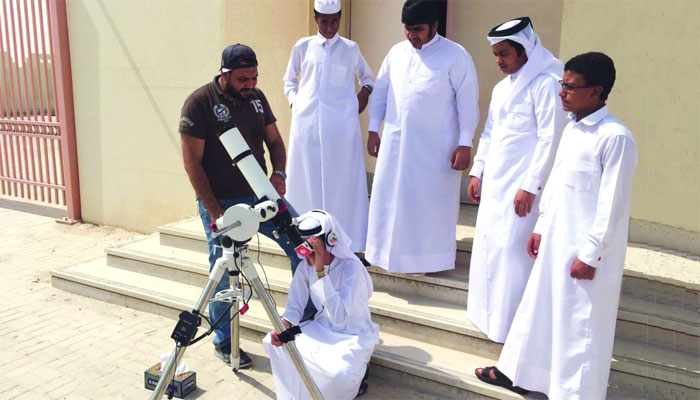Doha
In a novel initiative to nurture scientific skills of students, the Qatar Environment and Energy Research Institute (QEERI) at the Qatar Foundation for Education, Science and Community Development (QF) has launched an innovative project named "Fascination Astronomy" in 75 schools across the country.
All participating schools have been given a Galileoscope each.
The initiative aims to equip teachers in Qatar with the skills, tools and knowledge to inspire students to look to the sky and ask questions. Empowering the next generation of scientists, researchers and philosophers, "Fascination Astronomy" is aligned with QF’s overarching mission of unlocking human potential.
Dr Khalid al-Subai, the acting executive director, said: “This is the first time QEERI has organised an astronomy school and public outreach programme. Astronomy is one of the oldest sciences and the aim of this project is to inspire young men and women in Qatar to learn more about the subject.
“Astronomy represents a door to science. It is a vehicle for encouraging children to love science, it excites them. The subject inspires them to learn about what is in the sky, about the stars, what is in the cosmos, and where we stand in the universe.”
A series of one-day interactive workshops, hosted by a number of visiting lecturers and local QEERI researchers, kicked off the "Fascination Astronomy" project. These seminars targeted teachers from independent and international schools all around Qatar, with more than 80 attendees, including seven representatives from the Supreme Education Council (SEC).
During the seminars, attendees were given in-depth training on how to use the refractor telescope to teach their students.
A team from QEERI, in collaboration with the SEC, has begun visiting schools in Doha. The aim is to go into 30 high schools before the end of this year, and an additional 35 middle schools between January and April next year.
High school students will be challenged to complete a range of hands-on experiments and projects such as measuring the circumference of the earth as well as the distance between the moon and the earth.
Moreover, all participating schools will be given access to a network of telescopes located all over the world. Teachers will be able to request images from large telescopes based all over the globe.
The telescopes will then capture the images, and send them back to the schools, allowing students to view the night skies in places such as Chile, South Africa, Eastern Australia, and Texas.
Hani Dalee, an astronomy research assistant at QEERI, explained: “During the visits, we give lectures about the cosmos and inflate the portable planetarium, showing students and teachers things like sky rotations, the Zodiac signs, solstices and equinoxes, deep sky objects, and planets. It is a great virtual journey. Then, students are given the opportunity to view sunspots, filaments and prominences, and hear the sound of the boiling surface of the sun, all through the solar telescope.”
At the end of each visit, an astronomy club is founded and named after an astronomer, a planet, a star, or a constellation.
The mission of these projects is to form the first national competition in astronomy. Its winners will represent Qatar at the International Olympiad on Astronomy and Astrophysics in India next year.
The next step in "Fascination Astronomy" is reaching out to the public and organising community outreach sessions.

